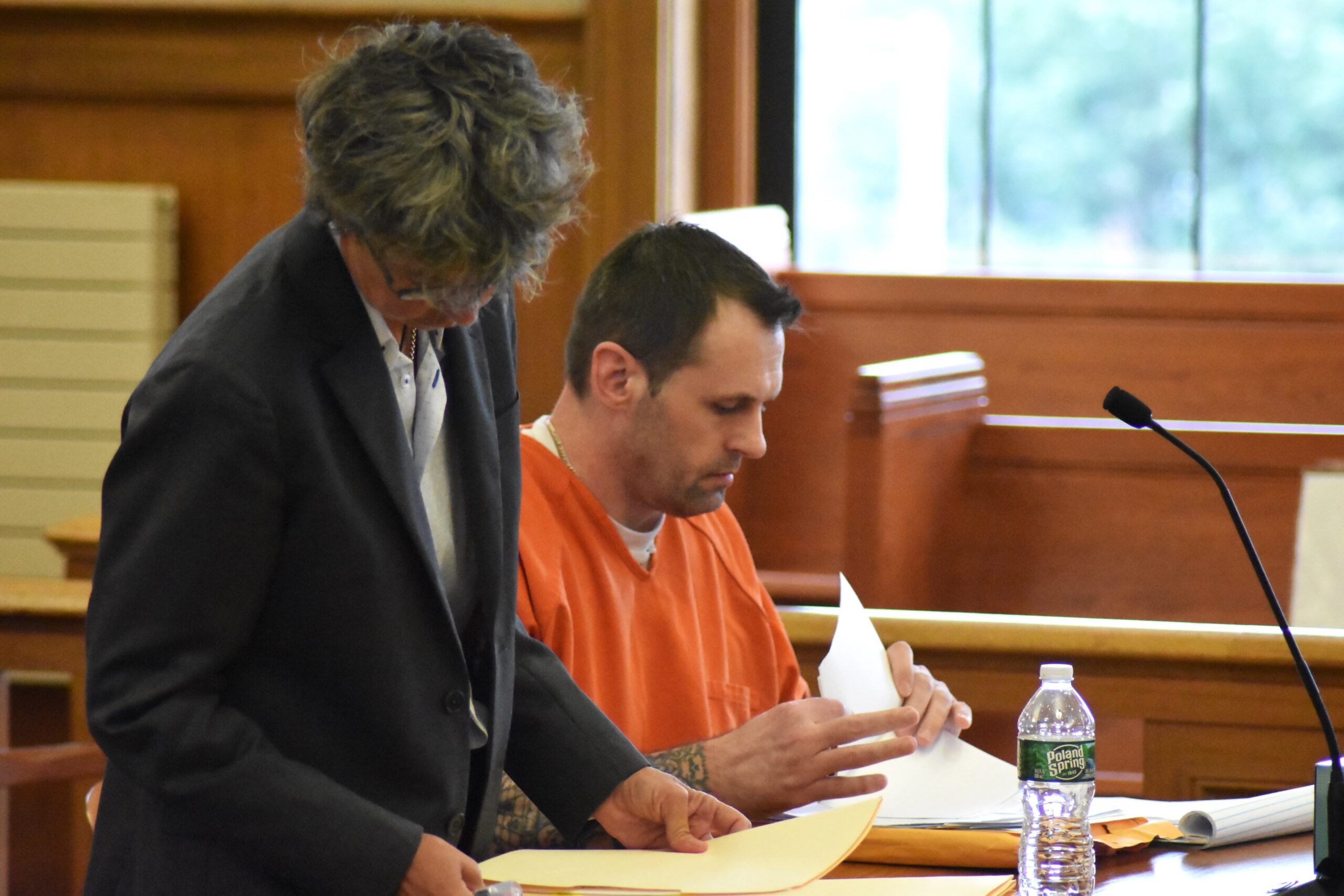
HOULTON, Maine — An Aroostook County man now serving a 60-year sentence in state prison for murder said during a post-conviction evidentiary hearing on Thursday that his trial in 2019 was rife with attorney missteps, flawed evidence and court bias.
James Paul Peaslee, 44, testified for nearly two hours in Aroostook County Superior Court, detailing how his former attorneys, Stephen Smith of Bangor and John Tebbetts of Presque Isle, did not represent his best interests.
They ignored his requests to ask the presiding judge to recuse himself from his murder trial, did not inform him of key information related to his appeal, wrongly advised him to not testify on his own behalf and did not investigate the previous record of a state’s witness, he said.
Peaslee was convicted of murder in the 2018 shooting death of his stepfather Paul Hilenski, 79, on Boundary Line Road in Bridgewater.
In a post-conviction evidentiary hearing, several things can happen including a new trial if the judge grants relief.
Peaslee is seeking the opportunity to appeal his conviction, according to his new attorney, Michelle King of Portland.
On Thursday, King had him read from a document he recently discovered in materials returned to him by former attorney Smith.
“It appears to be a conversation between my two lawyers around Feb. 5, 2019,” Peaslee told the court, proceeding to read the conversation between Smith and Tebbetts.
“I think we just let it all hang out, I don’t think there’s any question that he’s just crazier than a hoot owl,” Smith said.
Smith’s comment made Peaslee question having him as his lawyer, he said.
“I don’t need a person that’s representing my freedoms for the rest of my existence having that kind of mentality towards me,” he said. “It really made me wonder if he ever had my best interests in hand.”
In court, Smith was also asked to read the statement and he admitted he said it.
As his testimony moved on, Peaslee said that on the first day of his murder trial, the presiding judge, Justice Harold Stewart II, said that he was related to a key witness for the prosecution.
“I was thinking how is that possible, that’s a conflict of interest,” he said, explaining that he tried to get his lawyers to ask the judge to recuse himself but they did not.
Peaslee continued to ask his lawyers to do something and they finally asked the court for a recess.
He said he told them they had to ask the judge to recuse himself but they said they were not going to do it.
“I had to sit there and know that these lawyers were not going to do what I asked them to do in any situation,” he said.
Superior Court Justice Stephen Nelson asked Peaslee how he believed that affected the trial.
“I believe that Judge Stewart was biased,” he said, giving several examples. “I believe had I had an unbiased judge I would have had a much better trial.”
As the hearing continued Peaslee claimed the state’s witness, Matthew Clark, lied to get a reduced sentence and that Clark had done this on four other occasions.
Clark, who was in jail with Peaslee, told the court that Peaslee murdered Hilenski over a dispute involving his mother’s property. Clark said that Peaslee told him he got a .380 caliber gun, went to a convenience store to create an alibi, changed clothes, then went to the Hilenski home, knocked on the door and when Hilenski came to the door he shot him.
On cross-examination, Assistant Attorney General Leann Robbin asked Peaslee about Clark and evidence from the trial including a video tape.
In a contentious exchange between the two, Robbin’s questions included some that Peaslee had previously answered and he was frustrated with the repetition. Robbin also appeared disturbed by some of Peaslee’s comments and kept going back to questions related to the evidence in the trial.
Nelson asked that the questioning stay focused.
Attorneys Smith and Tebbetts testified about Peaslee’s allegations as well as explained why they did not ask the judge to recuse himself, why they advised that he not testify during the trial, why they did not file a sentencing memorandum and why he was not included in the appeal process.
Both attorneys said that Peaslee asked them to not prepare a sentencing memorandum.
Smith, who was lead counsel on Peaslee’s case, told the court that he did not recall Peaslee asking him for a recess to discuss recusal, despite it being in the court transcript. And he said he did not recall Peaslee asking for a recusal.
Regarding sentencing appeal, Tebbetts said he told Peaslee that he could appeal his sentence but he was not sure how much good it would do.
Both Nelson and King asked Tebbetts for clarification.
“I can’t remember my exact words, but I said it was a long shot, highly unlikely, and quite frankly I thought the court could have imposed a full life sentence,” he said.
He went on to say it was his understanding that his client did not want him to beg for a lesser sentence.
King and Robbin have 28 days to file briefs following Thursday’s hearing.







